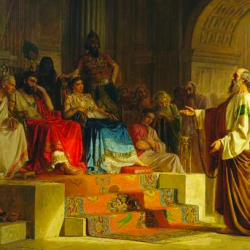Lectionary Reflections
Micah 5:2-5a
December 20, 2015
4th Sunday of Advent
It is one of the strange conundrums of the historical and theological use of Hebrew Bible texts that those most often quoted tend to be the most difficult to understand. Perhaps the most famous of these is the notorious Isaiah 7:14 where we are told something very vague about a "young woman" about to conceive whose child will not be very old ("able to discern bad from good") before some enemies of Judah will be vanquished. All of this charged language may relate to the specific historical event of the Syro-Ephraimitic war when the northern kingdom of Israel made a pact with the Syrians to the east to attack the Judeans in and around 734-733 B.C.E. That makes sense, I suppose, but the text has now slipped its historical moorings and has been used by Christians as a kind of prefiguring of the birth of Jesus over seven hundred years later. This legerdemain is made possible in part by the translation of the Hebrew "'almah" ("young woman") into the Greek parthenos (which can mean "young woman," but also can mean "virgin"; Hebrew 'almah does not mean virgin). For Matthew and Luke, "virgin" will do nicely, attesting to Jesus' more than normal birth. Once the historical contexts of ancient texts are wrenched from their own time, then later readers can have free rein to pull from the words whatever seems to fit their particular bills.
And so it is with Micah 5:2-5a. Here we are at Advent 4, and any words that tumble from our preacherly mouths speak of Jesus for our congregations, whether Jesus has anything to do with the words or not. By a long church contract, or perhaps better an agreed upon cabal, Micah 5 is about Jesus. Well, it surely is not about Jesus in the sense that it predicts his appearance. This is true in several ways, the most obvious of which is that it is extremely difficult to make sense of this text in its own 8th-century B.C.E. context, let alone its supposed connection to the man from Galilee some seven hundred years later. But of course that is precisely why the church snatched the text and stuck Jesus to it, because it is finally so obscure in its prophetic location as to defy easy understanding. I don't get it clearly, so it is fair game to play whatever role the church has decreed for it.
There is something quite disingenuous about this continual employment of Hebrew Bible texts to serve the theological needs of Christian apologists. And of course it is not benignly disingenuous only; it is also dangerous and potentially deadly. Once I determine that a text written for someone else has no clear meaning for those for whom it was written, then I can steal it and assume its "real" meaning is finally what I say it is. This renders any other meaning moot, and denigrates those who wrote it and those who first read it. It is nothing less than linguistic supercessionism, a form of anti-Jewishness that can and has turned deadly over the centuries.
Surely we can do better than this during this holy season of our Christian year. Surely this text can speak to our understanding of who Jesus is for us without tearing the text from Micah out by its roots and forcing it to become something it plainly is not. Let us at least try to find meaning that can illuminate the events of Bethlehem in fresh ways.
It was certainly easy for early Christian commentators to read Micah 5:2 (5:1 in Hebrew) and conclude that the "one who is to come forth from Bethlehem to rule in Israel" is no other than the one they came to call Messiah. But of course when an 8th-century Judean read that, she would think of no one but the mighty David, that brilliant albeit notorious second king of Israel who had been dead for some two hundred years but whose memory had not been dimmed by those years. After all, 2 Samuel 7 had promised that a direct descendant of David's would sit on the throne of Israel forever. Who else could this promised monarch be but a direct heir of the great David? That fact was no problem for the Christian readers who quickly connected Jesus with David in as many ways as they could imagine: born in Bethlehem, in the genealogical line of the king according to Matthew and Luke, called "king of the Jews" in each of the gospels.
Yet, Micah says that this one's "origins (coming forth) are from of old (the word can also mean "east"), from days of 'olam." The word 'olam is notoriously slippery in meaning. "Ancient days" reads NRSV, and that is not wrong. But Koheleth 3:14 says that God puts 'olam into human minds in such a way that they may know a bit of what has happened in the past, and a tiny portion of what may come, but just enough to teach them that they in fact know precious little about either past or future in the end. There the word appears to mean something like a very long time or deep in the past and far into the future, not quite eternity but as much as any puny human mind may conceive.





